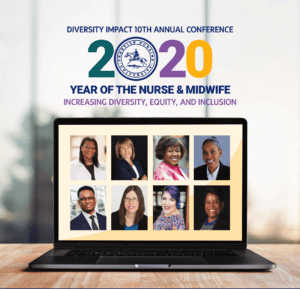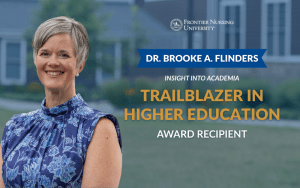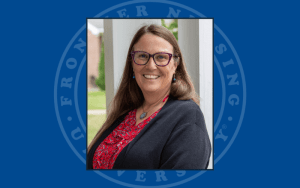 On June 11-13, 2020 the Office of Diversity, Equity, and Inclusion (DEI) at Frontier Nursing University (FNU) hosted the 10th Annual Diversity Impact Conference. FNU started this tradition in 2010 alongside the launch of the Diversity Impact Program which was introduced with the primary goal of increasing diversity in enrollment while providing a more inclusive environment and stronger support system for all students. Since the launch of the Diversity Impact Program, we have seen FNU’s enrollment of students of color rise from 9 percent to 24 percent, numbers we are extremely proud of, but hope will continue to grow.
On June 11-13, 2020 the Office of Diversity, Equity, and Inclusion (DEI) at Frontier Nursing University (FNU) hosted the 10th Annual Diversity Impact Conference. FNU started this tradition in 2010 alongside the launch of the Diversity Impact Program which was introduced with the primary goal of increasing diversity in enrollment while providing a more inclusive environment and stronger support system for all students. Since the launch of the Diversity Impact Program, we have seen FNU’s enrollment of students of color rise from 9 percent to 24 percent, numbers we are extremely proud of, but hope will continue to grow.
The first Diversity Impact Conference was introduced with the hopes of engaging students in culture and thought that differs from their own as a means to expand awareness and understanding of those that differ from them. At our conference, we highlight issues involving race, culture, and the LGBTQ community through speakers, discussions, and small group activities. Due to COVID-19, we chose to continue this event on a digital platform this year, which may have looked a little different, but still provided a great weekend of community and enlightenment.
This year’s conference theme, ‘Year of the Nurse and Midwife 2020: Increasing Diversity, Equity, and Inclusion’ followed the lead of the World Health Organization (WHO) which designated 2020 as the Year of the Nurse and the Midwife. The rise of COVID-19 has highlighted to the world the importance of quality nursing and midwifery care, and at FNU, we believe that in order to provide the best quality nursing and midwifery care to all people, cultural respect and inclusion are essential.
The conference began Thursday, June 11 with introductions from the Chief Diversity and Inclusion Officer (CDIO) Geraldine Young. The Office of Diversity, Equity, and Inclusion staff, the Diversity Impact Adhoc Committee, moderators, academic leadership, and support were introduced along with a briefing from the CDIO, including a moment of silence for those affected by the COVID-19 Pandemic and racism. Introductions were followed by a welcome address from FNU president, Susan Stone emphasizing the school’s goals of encouraging and promoting diversity, equity, and inclusion and emphasizing the effects of White Privilege.
Following Dr. Stone’s address was premier speaker Kenya Beard, Dean of Nursing and Health Sciences at Nassau Community College. Dr. Beard is a nurse educator with over 30 years of nursing experience in acute and long-term care settings. Students across the state seek her assistance to prepare for and pass the NCLEX-RN, as she has improved the NCLEX-RN pass rate for several nursing programs in New York. Dr. Beard received her EdD from Dowling College and her MS in Adult Health from Stony Brook University.
In her session “Addressing Health Disparities: The Role of Healthcare Providers & Educators,” Dr. Beard discussed how structural racism impacts health equity, healthcare disparities, and social determinants of health (SDOH). She left attendees with meaningful ways to facilitate race-related discourse.
On Friday, our keynote speaker, Milagros Phillips AKA ‘The Race Healer’, addressed the conference with a comprehensive speech titled “What is Race Literacy – 4 Dimensions of Racial Conditioning”. This impactful speech focused on the ways in which we may be conditioned by race and described how coming face to face with our own biases can transform our work and liberate our hearts.
Other thought-provoking speakers included Ronald Hickman Jr. on “Everyday Biases: We all Have Them and Can Manage Them”, Laura Manns-James on “Microaggressions in Nursing Education and Health: Why They Matter and What We Can Do About Them” and Katrin Moskowitz on “The “Ask Me How I Am Project”: The Discussion of Mental Health and Suicide Among Health Care Workers.”
Throughout the weekend students also engaged in virtual networking sessions, breakout small groups, tabletop discussions, and optional virtual lunches with faculty and staff. As a bonus to the virtual experience, we also included an online scavenger hunt that encouraged participants to engage with FNU on social media and share their conference experiences.
Winners of the Virtual Scavenger Hunt, a free T-shirt, and other goodies are:
- Kelly Wilson
- Cassie Henry
- April Karyn Haneline
- Adrienne Christner
- Gretchen Grey
- Sydney Boone
- Alisha Cigalotti
- Nancy Carter
Congratulations and thank you for participating!
The conference ended Saturday evening following a fantastic weekend of community, respect, knowledge, and self-evaluation. A huge thanks to all of our speakers, faculty, and staff that helped to make this event possible. Next year, we hope once again to be able to engage in this time of personal and professional growth in person but are also overwhelmed with the success and positive feedback from our virtual experience.
Here is what some of this year’s participants had to say about our virtual Diversity Impact Conference:
“Thank you for organizing such a wonderful event. I have laughed, cried, and learned so much. I don’t even think that I have processed everything yet, but I know that I am a better person because I attended this event. Thank you.” – Angela Bailey, FNU Chief Advancement Officer
“Thank you so much for all of the hard work that you put into making the virtual Diversity Impact Conference happen this year. Every single speaker and activity was informative and inspirational… This was my first year attending, but it will certainly not be my last.” – Melinda M. Hancock
“The conference is a big success. A big thank you.” – Diane John, FNU faculty
“Dr. Beard’s session was so insightful. I learned to be more aware of implicit bias and to stand up for others and my patients to ensure the best care for all (even if it causes a “disagreement” with a doctor!). Also, thank you to Dr. Stone for an amazing presentation.” – Kelly Wilson
Thank you to everyone who joined us, we hope to see you again for our Diversity Impact Conference 2021! To learn more about FNU’s Diversity Impact program, visit Frontier.edu/Diversity.






















 Carrie Belin is an experienced board-certified Family Nurse Practitioner and a graduate of the Johns Hopkins DNP program, Johns Hopkins Bloomberg School of Public Health, Georgetown University School of Nursing, and Johns Hopkins School of Nursing. She has also completed fellowships at Georgetown and the University of California Irvine.
Carrie Belin is an experienced board-certified Family Nurse Practitioner and a graduate of the Johns Hopkins DNP program, Johns Hopkins Bloomberg School of Public Health, Georgetown University School of Nursing, and Johns Hopkins School of Nursing. She has also completed fellowships at Georgetown and the University of California Irvine. Angie has been a full-scope midwife since 2009. She has experience in various birth settings including home, hospital, and birth centers. She is committed to integrating the midwifery model of care in the US. She completed her master’s degree in nurse-midwifery at Frontier Nursing University (FNU) and her Doctorate at Johns Hopkins University. She currently serves as the midwifery clinical faculty at FNU. Angie is motivated by the desire to improve the quality of healthcare and has led quality improvement projects on skin-to-skin implementation, labor induction, and improving transfer of care practices between hospital and community midwives. In 2017, she created a short film on skin-to-skin called
Angie has been a full-scope midwife since 2009. She has experience in various birth settings including home, hospital, and birth centers. She is committed to integrating the midwifery model of care in the US. She completed her master’s degree in nurse-midwifery at Frontier Nursing University (FNU) and her Doctorate at Johns Hopkins University. She currently serves as the midwifery clinical faculty at FNU. Angie is motivated by the desire to improve the quality of healthcare and has led quality improvement projects on skin-to-skin implementation, labor induction, and improving transfer of care practices between hospital and community midwives. In 2017, she created a short film on skin-to-skin called 










 Justin C. Daily, BSN, RN, has ten years of experience in nursing. At the start of his nursing career, Justin worked as a floor nurse on the oncology floor at St. Francis. He then spent two years as the Director of Nursing in a small rural Kansas hospital before returning to St. Francis and the oncology unit. He has been in his current position as the Chemo Nurse Educator for the past four years. He earned an Associate in Nurse from Hutchinson Community College and a Bachelor of Science in Nursing from Bethel College.
Justin C. Daily, BSN, RN, has ten years of experience in nursing. At the start of his nursing career, Justin worked as a floor nurse on the oncology floor at St. Francis. He then spent two years as the Director of Nursing in a small rural Kansas hospital before returning to St. Francis and the oncology unit. He has been in his current position as the Chemo Nurse Educator for the past four years. He earned an Associate in Nurse from Hutchinson Community College and a Bachelor of Science in Nursing from Bethel College. Brandy Jackson serves as the Director of Undergraduate Nursing Programs and Assistant Educator at Wichita State University and Co-Director of Access in Nursing. Brandy is a seasoned educator with over 15 years of experience. Before entering academia, Brandy served in Hospital-based leadership and Critical Care Staff nurse roles. Brandy is passionate about equity in nursing education with a focus on individuals with disabilities. Her current research interests include accommodations of nursing students with disabilities in clinical learning environments and breaking down barriers for historically unrepresented individuals to enter the nursing profession. Brandy is also actively engaged in Interprofessional Education development, creating IPE opportunities for faculty and students at Wichita State. Brandy is an active member of Wichita Women for Good and Soroptimist, with the goal to empower women and girls. Brandy is a TeamSTEPPS master trainer. She received the DASIY Award for Extraordinary Nursing Faculty in 2019 at Wichita State University.
Brandy Jackson serves as the Director of Undergraduate Nursing Programs and Assistant Educator at Wichita State University and Co-Director of Access in Nursing. Brandy is a seasoned educator with over 15 years of experience. Before entering academia, Brandy served in Hospital-based leadership and Critical Care Staff nurse roles. Brandy is passionate about equity in nursing education with a focus on individuals with disabilities. Her current research interests include accommodations of nursing students with disabilities in clinical learning environments and breaking down barriers for historically unrepresented individuals to enter the nursing profession. Brandy is also actively engaged in Interprofessional Education development, creating IPE opportunities for faculty and students at Wichita State. Brandy is an active member of Wichita Women for Good and Soroptimist, with the goal to empower women and girls. Brandy is a TeamSTEPPS master trainer. She received the DASIY Award for Extraordinary Nursing Faculty in 2019 at Wichita State University.  Dr. Sabrina Ali Jamal-Eddine is an Arab-disabled queer woman of color with a PhD in Nursing and an interdisciplinary certificate in Disability Ethics from the University of Illinois Chicago (UIC). Dr. Jamal-Eddine’s doctoral research explored spoken word poetry as a form of critical narrative pedagogy to educate nursing students about disability, ableism, and disability justice. Dr. Jamal-Eddine now serves as a Postdoctoral Research Associate in UIC’s Department of Disability and Human Development and serves on the Board of Directors of the National Organization of Nurses with Disabilities (NOND). During her doctoral program, Sabrina served as a Summer Fellow at a residential National Endowment of the Humanities (NEH) Summer Institute at Arizona State University (2023), a summer fellow at Andrew W. Mellon’s National Humanities Without Walls program at University of Michigan (2022), a Summer Research Fellow at UC Berkeley’s Othering & Belonging Institute (2021), and an Illinois Leadership Education in Neurodevelopmental and related Disabilities (LEND) trainee (2019-2020).
Dr. Sabrina Ali Jamal-Eddine is an Arab-disabled queer woman of color with a PhD in Nursing and an interdisciplinary certificate in Disability Ethics from the University of Illinois Chicago (UIC). Dr. Jamal-Eddine’s doctoral research explored spoken word poetry as a form of critical narrative pedagogy to educate nursing students about disability, ableism, and disability justice. Dr. Jamal-Eddine now serves as a Postdoctoral Research Associate in UIC’s Department of Disability and Human Development and serves on the Board of Directors of the National Organization of Nurses with Disabilities (NOND). During her doctoral program, Sabrina served as a Summer Fellow at a residential National Endowment of the Humanities (NEH) Summer Institute at Arizona State University (2023), a summer fellow at Andrew W. Mellon’s National Humanities Without Walls program at University of Michigan (2022), a Summer Research Fellow at UC Berkeley’s Othering & Belonging Institute (2021), and an Illinois Leadership Education in Neurodevelopmental and related Disabilities (LEND) trainee (2019-2020). Vanessa Cameron works for Vanderbilt University Medical Center in Nursing Education & Professional Development. She is also attending George Washington University and progressing towards a PhD in Nursing with an emphasis on ableism in nursing. After becoming disabled in April 2021, Vanessa’s worldview and perspective changed, and a recognition of the ableism present within healthcare and within the culture of nursing was apparent. She has been working since that time to provide educational foundations for nurses about disability and ableism, provide support for fellow disabled nursing colleagues, and advocate for the disabled community within healthcare settings to reduce disparities.
Vanessa Cameron works for Vanderbilt University Medical Center in Nursing Education & Professional Development. She is also attending George Washington University and progressing towards a PhD in Nursing with an emphasis on ableism in nursing. After becoming disabled in April 2021, Vanessa’s worldview and perspective changed, and a recognition of the ableism present within healthcare and within the culture of nursing was apparent. She has been working since that time to provide educational foundations for nurses about disability and ableism, provide support for fellow disabled nursing colleagues, and advocate for the disabled community within healthcare settings to reduce disparities. Dr. Lucinda Canty is a certified nurse-midwife, Associate Professor of Nursing, and Director of the Seedworks Health Equity in Nursing Program at the University of Massachusetts Amherst. She earned a bachelor’s degree in nursing from Columbia University, a master’s degree from Yale University, specializing in nurse-midwifery, and a PhD from the University of Connecticut. Dr. Canty has provided reproductive health care for over 29 years. Her research interests include the prevention of maternal mortality and severe maternal morbidity, reducing racial and ethnic health disparities in reproductive health, promoting diversity in nursing, and eliminating racism in nursing and midwifery.
Dr. Lucinda Canty is a certified nurse-midwife, Associate Professor of Nursing, and Director of the Seedworks Health Equity in Nursing Program at the University of Massachusetts Amherst. She earned a bachelor’s degree in nursing from Columbia University, a master’s degree from Yale University, specializing in nurse-midwifery, and a PhD from the University of Connecticut. Dr. Canty has provided reproductive health care for over 29 years. Her research interests include the prevention of maternal mortality and severe maternal morbidity, reducing racial and ethnic health disparities in reproductive health, promoting diversity in nursing, and eliminating racism in nursing and midwifery. Dr. Lisa Meeks is a distinguished scholar and leader whose unwavering commitment to inclusivity and excellence has significantly influenced the landscape of health professions education and accessibility. She is the founder and executive director of the DocsWithDisabilities Initiative and holds appointments as an Associate Professor in the Departments of Learning Health Sciences and Family Medicine at the University of Michigan.
Dr. Lisa Meeks is a distinguished scholar and leader whose unwavering commitment to inclusivity and excellence has significantly influenced the landscape of health professions education and accessibility. She is the founder and executive director of the DocsWithDisabilities Initiative and holds appointments as an Associate Professor in the Departments of Learning Health Sciences and Family Medicine at the University of Michigan. Dr. Nikia Grayson, DNP, MSN, MPH, MA, CNM, FNP-C, FACNM (she/her) is a trailblazing force in reproductive justice, blending her expertise as a public health activist, anthropologist, and family nurse-midwife to champion the rights and health of underserved communities. Graduating with distinction from Howard University, Nikia holds a bachelor’s degree in communications and a master’s degree in public health. Her academic journey also led her to the University of Memphis, where she earned a master’s in medical anthropology, and the University of Tennessee, where she achieved both a master’s in nursing and a doctorate in nursing practice. Complementing her extensive education, she completed a post-master’s certificate in midwifery at Frontier Nursing University.
Dr. Nikia Grayson, DNP, MSN, MPH, MA, CNM, FNP-C, FACNM (she/her) is a trailblazing force in reproductive justice, blending her expertise as a public health activist, anthropologist, and family nurse-midwife to champion the rights and health of underserved communities. Graduating with distinction from Howard University, Nikia holds a bachelor’s degree in communications and a master’s degree in public health. Her academic journey also led her to the University of Memphis, where she earned a master’s in medical anthropology, and the University of Tennessee, where she achieved both a master’s in nursing and a doctorate in nursing practice. Complementing her extensive education, she completed a post-master’s certificate in midwifery at Frontier Nursing University.









 Dr. Tia Brown McNair is the Vice President in the Office of Diversity, Equity, and Student Success and Executive Director for the Truth, Racial Healing, and Transformation (TRHT) Campus Centers at the American Association of Colleges and Universities (AAC&U) in Washington, DC. She oversees both funded projects and AAC&U’s continuing programs on equity, inclusive excellence, high-impact practices, and student success. McNair directs AAC&U’s Summer Institutes on High-Impact Practices and Student Success, and TRHT Campus Centers and serves as the project director for several AAC&U initiatives, including the development of a TRHT-focused campus climate toolkit. She is the lead author of From Equity Talk to Equity Walk: Expanding Practitioner Knowledge for Racial Justice in Higher Education (January 2020) and Becoming a Student-Ready College: A New Culture of Leadership for Student Success (July 2016 and August 2022 Second edition).
Dr. Tia Brown McNair is the Vice President in the Office of Diversity, Equity, and Student Success and Executive Director for the Truth, Racial Healing, and Transformation (TRHT) Campus Centers at the American Association of Colleges and Universities (AAC&U) in Washington, DC. She oversees both funded projects and AAC&U’s continuing programs on equity, inclusive excellence, high-impact practices, and student success. McNair directs AAC&U’s Summer Institutes on High-Impact Practices and Student Success, and TRHT Campus Centers and serves as the project director for several AAC&U initiatives, including the development of a TRHT-focused campus climate toolkit. She is the lead author of From Equity Talk to Equity Walk: Expanding Practitioner Knowledge for Racial Justice in Higher Education (January 2020) and Becoming a Student-Ready College: A New Culture of Leadership for Student Success (July 2016 and August 2022 Second edition).